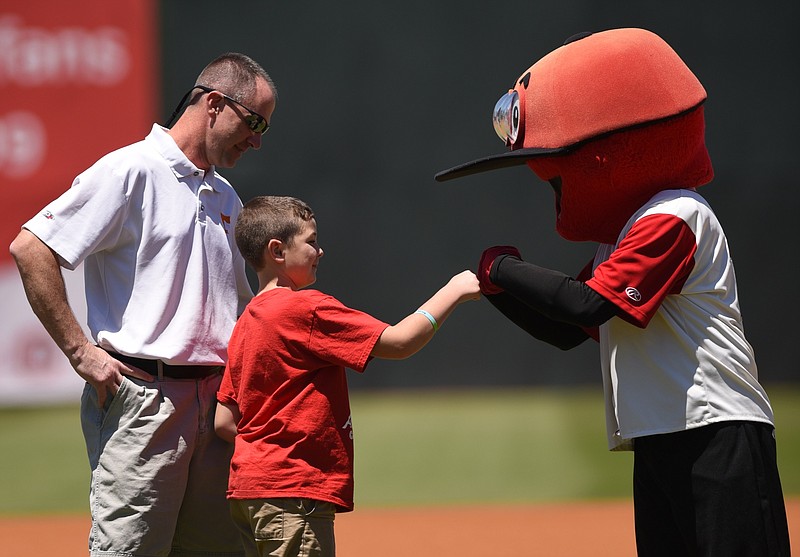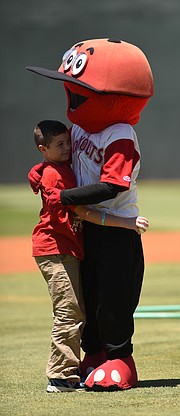The call came in early in the afternoon on June 5, Laura Kirk remembers.
It was already a special day for her, her first flight as a nurse in an Erlanger Life Force medical helicopter after completing her training.
She, paramedic Ray Cadwallader, and Karen Mulvaney, the flight nurse who was doing Kirk's orientation, rushed to the helicopter at the hospital's chopper base in Sparta, Tenn., one of five Erlanger operates in the region.
All they knew before taking off was they were heading to the scene of a "pediatric boating accident."
The ambulance arrived at the scene, on Center Hill Lake in DeKalb County, Tenn., about the same time as they landed, Kirk said.
Her first case would be one she would never forget.
An 8-year-old boy, Aiden Brown, had been on the lake with his parents in a pontoon boat. Aiden was sitting on the front of the boat while his dad steered, towing an innertube behind. The boat hit a wave. Aiden's mom, Julie, turned around, and he was gone.
Aiden fell overboard, between the pontoons, and the boat's propeller ripped into his body.
The blade sliced open his chest, exposing his heart and lungs, and cut through the sac surrounding his heart.
"A couple of millimeters' difference - had it hit his heart it would have meant instant death," Cadwallader said.
Aiden was alive, but in very bad shape, gasping for breath, with wounds to his neck and head, Kirk said. His dad, Troy, was pressing on his neck to stop the bleeding.
"He told us to leave him alone," Kirk said, evidence Aiden was in shock.
When a medical helicopter first lands, the medical team faces a critical decision - get the patient on board as fast as possible and hurry to the hospital? Or provide as much care as possible on-scene, to manage the injuries?
With Aiden, there was little choice, Cadwallader said. He had to be stabilized, his breathing restored, before they could risk the flight to Erlanger.
Aiden had lost about 40 percent of his blood, but Life Force helicopters carry blood and plasma onboard. A tube was connected and the life-giving fluid streamed back into his body.
To help his breathing, he needed a tube inserted in his neck, but first he needed to be put into a chemical coma to keep him from gagging on the tube. Mulvaney got an IV into a vein in his arm and the drugs were pumped into his restored bloodstream. Aiden lost consciousness.
Twenty-six minutes after landing, the team had him stabilized and loaded into the cramped space behind the pilot. But his temperature was only 91 degrees, perilously close to the point when his body would shut down. The air conditioner in the helicopter was turned off and the heat turned on, to keep him warm.
The flight to Erlanger took another 25 minutes.
"I was really happy to hand him over to them," Kirk remembered in an interview Thursday.
Only then did she realize what she had been through in her all-too-real orientation.
All three team members were exhausted, their long-sleeved flight suits soaked with sweat.
"I had a Gatorade, " Kirk remembered. "Only then does it hit you."
Aiden spent eight days in the hospital, but a month later, he was fully recovered, visiting the Life Force hangar, clambering around the helicopter and trying on the pilot's helmet.
For their efforts, Kirk, Cadwallader and Mulvaney, along with pilot Chuck Nabors and communicator Heather Marsh, were given the state Star of Life award by the Tennessee Emergency Medical Services.
But Cadwallader said they had already received another type of award.
"To see Aiden running around the helicopter, that was the real payoff, " Cadwallader said.
At the ceremony in Nashville, Life Force crew members Glenn Susskind, Tina Biggs, Brad Simmons and Andy Lopez also won the Region 3 Star of Life award for saving a 5-year-old Bradley County boy from choking to death.
Contact reporter Steve Johnson at sjohnson@timesfreepress.com, 423-757-6673, on Twitter @stevejohnsonTFP, and on Facebook, www.facebook/noogahealth.

